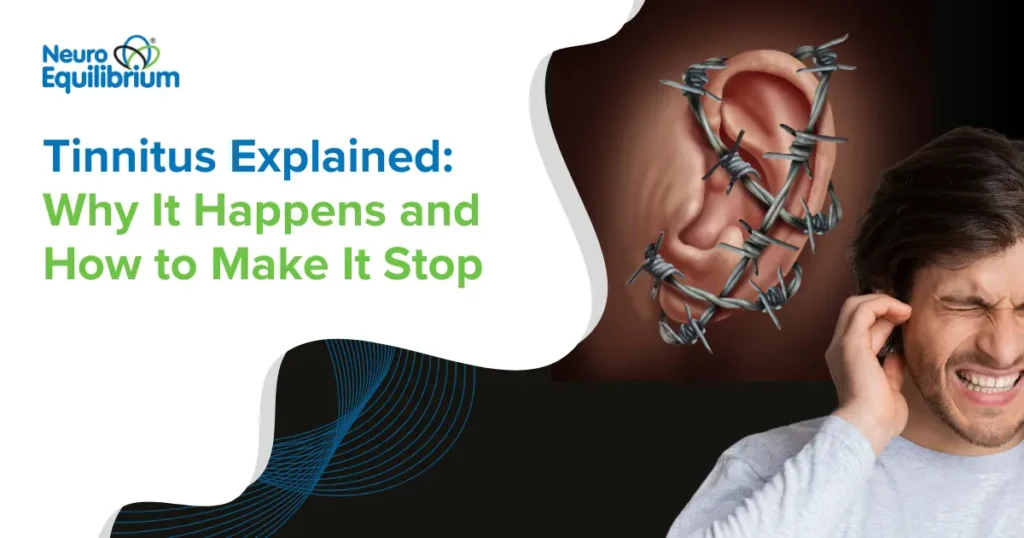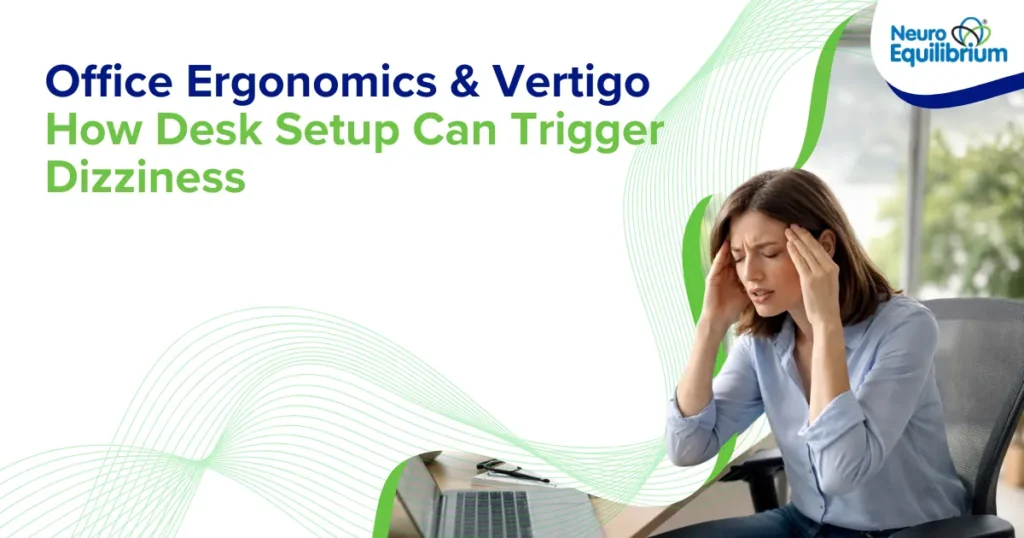Tinnitus is a phantom sensation of sound which means that the person hears sounds like ringing, buzzing, hissing, or whooshing even though there’s no external noise. Tinnitus isn’t a disease; it’s actually a symptom of an underlying disorder like hearing loss, ear infection, or acoustic trauma.
Tinnitus is surprisingly common – around 15-20% of people experience it at some point. It happens more often as people age, but it’s also common among young people who listen to loud music or work in noisy environments. It can affect one or both ears, vary in volume from loud to soft, and may be constant or intermittent. Though it is a common problem, it can be quite distressing, interfering with daily activities and sleep and affecting concentration. Understanding more about tinnitus can help people feel more comfortable asking for support and finding ways to manage it.
Explore More About Tinnitus:
- Understanding Tinnitus: Causes and Symptoms
- Tinnitus Explained: Why It Happens and How to Make It Stop
Types of Tinnitus
Tinnitus can be of two types according to the quality of sound perceived -: subjective or objective. The type of tinnitus helps in determining the cause and management of the disorder.
1. Subjective Tinnitus
This is the most common type, where the sound is heard only by the affected individual. There are many causes which can lead to tinnitus like hearing loss due to reduced auditory nerve function, long-term exposure to loud noises, or ear problems like infections or even impacted wax. The intensity and quality of the sound can vary.
Some people complain of hearing music or voices in the absence of any external source. This type of subjective tinnitus has origins in the central nervous system in areas like the auditory cortex or limbic system.
2. Objective Tinnitus
This is a rarer type of tinnitus where the doctor can hear the sound with special equipment, like a stethoscope. Objective tinnitus is vascular or mechanical in origin. The vascular causes are due to obstruction in the blood vessels leading to a turbulent blood flow. The mechanical causes include abnormal muscle contractions in the middle ear, palate or nasopharynx.
It is now preferred to term objective tinnitus as “somatic sound” and use the word tinnitus to mean only subjective tinnitus.
Why Does Tinnitus Occur?
Tinnitus can result from various causes, often linked to ear disorders, underlying medical conditions and even lifestyle factors. . Here’s a breakdown of some of the common reasons:
- Ear and Sinus Infections: Ear or sinus infections can cause swelling and fluid buildup, creating pressure in the ear that may result in ringing sounds.
- Blockage from Ear wax: Ear wax protects our ears, but too much can block sound from passing through properly, causing ringing or buzzing sounds.
- Meniere’s Disease: This inner ear disorder is caused by increased inner ear fluid pressure leading to episodes of dizziness, fluctuating hearing loss and tinnitus. In this condition , the tinnitus is typically a low frequency roaring sound which is fluctuating in the early stages and may become persistent as the disease progresses.
- Hearing Loss: As people get older, their hearing can decline. This can sometimes lead to tinnitus because the brain may try to “fill in” missing sounds. The pitch of the tinnitus typically matches with the hearing loss frequencies.
- Exposure to Loud Sounds: Exposure to loud sounds can damage the delicate outer hair cells of the cochlea which is responsible for hearing. The sound exposure may be for long periods as an occupational hazard like construction sites, factories, military training involving shooting, etc. It is important to wear ear protection aids to avoid damage to the ear in these situations. Sudden acoustic trauma as seen in concerts, listening to very loud music, firecrackers, etc. can also damage the tiny hair cells in the ear leading to tinnitus
- Head or Neck Injury: Injuries of the head or neck can sometimes impact the nerves of hearing or disrupt blood flow to the ears, leading to tinnitus.
- Tumor on the Hearing Nerve (VIII Cranial Nerve): This rare tumor called Vestibular schwannoma or acoustic neuroma compresses the nerve responsible for hearing, potentially causing tinnitus in one ear.
- Temporomandibular Joint Disorder (TMJ): The temporomandibular joint links the jaw to the skull. Due to its proximity to the ear, problems with this joint can sometimes cause tinnitus.
- Otosclerosis: This is a condition where the tiny bones in the middle ear(typically the smallest bone of the body – the stapes) becomes jammed not allowing the bony chain to transmit sound to the inner ear., This can lead to hearing loss and, in some cases, tinnitus.
- Migraine Headaches: Migraines can sometimes affect blood flow or nerves near the ear, which can result in temporary or lasting tinnitus.
- Medical Conditions: Some medical conditions like hypo or hyperthyroidism, diabetes, high blood pressure, heart disease, and certain blood disorders, can cause or worsen tinnitus.
- Side Effects of Medications: Certain medicines can sometimes cause ringing in the ears, like aspirin, some antibiotics(typically the”-mycin” group),anti-malarial medicines or even certain antidepressants. This effect typically subsides once you stop taking the medication.
- Excessive Alcohol, Caffeine, or Smoking: Drinking too much alcohol, caffeine, or smoking can increase blood pressure or affect blood flow, leading to tinnitus.
- Extreme Stress and Fatigue: Stress and fatigue can make the brain more sensitive to internal sounds, making tinnitus worse or more noticeable.


For those facing tinnitus, NeuroEquilibrium offers advanced diagnostic and treatment options tailored to each individual’s needs. With our expertise in managing vertigo, dizziness, and related balance issues, we approach tinnitus as a symptom linked to underlying causes that we can diagnose and address. Through our specialized tests and a holistic view of inner ear and balance-related health, we work to alleviate symptoms and enhance our patients’ quality of life.
Common Signs of Tinnitus and Its Effects on Daily Life
- Sounds in the ear: The main sign of tinnitus is hearing sounds like ringing, buzzing, or clicking in your ears even when it’s quiet around you. These sounds might come and go or stay constant, and they can be loud or soft, high-pitched or low and sometimes, the sounds can change over time.
- Trouble Sleeping and Focusing: Tinnitus can disturb the sleeping pattern.. When everything else is quiet, the sounds can seem louder, making it difficult to fall asleep or stay asleep. Tinnitus can also make focusing hard leading to difficulty in concentrating, especially in quiet settings. This can affect how well you do with schoolwork or other tasks.
- Feeling Stressed, Anxious, or Down: Living with constant noise in your ears can lead to stress, anxiety, or distress. When people lose sleep and struggle to focus, they often feel more tired and frustrated, which can make the ringing seem worse.
- A Cycle of Stress and Anxiety: For many, the discomfort from tinnitus creates a loop of anxiety and stress. Stress can make the sounds feel more intense, which, in turn, leads to more anxiety. This cycle can make managing daily life feel even harder.
Diagnosing Tinnitus
Diagnosing tinnitus accurately involves understanding its unique characteristics, such as pitch, loudness, along with a thorough audiological evaluation. Healthcare providers use various diagnostic tests to evaluate the tinnitus which guides effective treatment planning. Below are some common methods used to assess tinnitus symptoms.
- Visual Analogue Scale (VAS): The VAS allows patients to rate the loudness of their tinnitus on a scale from 0 to 10. This helps doctors understand how intense the tinnitus feels and how much it impacts daily life.It is also a useful tool to compare the results of treatment.
- Audiometry: Audiometry is a hearing test which uses pure tones to assess the hearing function at different frequencies.. Since hearing loss often co-exists with tinnitus, this test can reveal the type and severity of hearing loss, providing clues for treatment.
- Tinnitus Matching and Masking: In this test, the patient is exposed to different sound frequencies and intensities to find the sound that closely resembles their own tinnitus. This helps doctors understand the pitch and tone of the tinnitus, which can be useful for personalized treatment.
- Impedance Audiometry with Eustachian Tube (ET) Function Tests: This test checks the pressure and reflexes in the middle ear and the health of the Eustachian tube. It’s helpful for identifying any middle ear issues that may be causing tinnitus.
- Otoacoustic Emissions(OAE): This test is used to evaluate the function of outer hair cells of the cochlea. This test is specially useful in the diagnosis of Noise – induced Tinnitus.
At NeuroEquilibrium, we specialize in advanced diagnostic tools and assessments to understand the unique characteristics of each patient’s tinnitus. Our approach ensures a precise diagnosis, allowing us to tailor a treatment plan that best suits each patient’s needs.
Tinnitus Treatments
Treating tinnitus effectively starts with understanding its root cause, whether it’s related to ear issues, medication side effects, or lifestyle factors. Living with tinnitus depends on the kind of treatment that a person is willing to undertake together with hearing aids and other therapies to alleviate the signs and symptoms. Here are some of the most helpful treatment interventions that may be used to minimize the impact of tinnitus on a sufferer’s day-to-day life.
1. Addressing the Cause
- Earwax Buildup: If earwax is the problem, an ENT specialist can safely remove it, often giving instant relief.
- Ear Infection: Antibiotics can help treat any infections in the ear that might be causing tinnitus.
- TMJ Disorder: If the tinnitus is linked to jaw issues, a dentist or ENT doctor can provide treatments to help with alignment or other jaw-related problems.
- Vestibular Migraine : Lifestyle modifications and migraine prophylaxis are required.
- Meniere’s Disease : Low salt diet with specialized treatment for Meniere’s disease needs to be started to reduce the inner ear pressure level.
2. Medications
- Anti-Anxiety or Antidepressants: These medications don’t stop tinnitus but can help you feel less anxious or stressed about it, which can make the ringing seem quieter.
3. Hearing Devices
- Hearing Aids: If tinnitus is related to hearing loss, hearing aids can improve overall hearing and make the tinnitus less noticeable.
- Masking Devices: These create background sounds that blend with the tinnitus, making it seem less intense.
- Tinnitus Instruments: These combine hearing aids and masking features for people with both hearing loss and tinnitus.
4. Therapies and Techniques
- Tinnitus Retraining Therapy (TRT): This combines sound therapy and counseling to train the brain to treat tinnitus as a neutral sound, so it feels less annoying.
- Biofeedback: By learning to control stress reactions, biofeedback can help reduce the impact of tinnitus.
- Cognitive Behavioral Therapy (CBT): This therapy helps patients learn new ways to respond to tinnitus, combining counseling with sound masking.
- Cochlear Implants: For those with severe hearing loss, these implants can reduce tinnitus long-term.
- White Noise Generators: These play calming sounds, like waves or rain, to help distract from tinnitus and make it easier to relax.
At NeuroEquilibrium, we’re committed to helping people manage and reduce the effects of tinnitus. Our comprehensive approach includes access to advanced diagnostics and tailored treatment plans to help patients find the most effective solutions for lasting relief.
Tips to Prevent Tinnitus and Protect Your Hearing
1. Limit Exposure to Loud Sounds
Wear sound protection devices or noise-canceling headphones in noisy environments to shield your ears and lower the risk of hearing loss.
2. Get Regular Hearing Check-Ups
Regular hearing exams with a doctor can catch any issues early. Keeping your ears clean and free from infections or blockages also helps prevent tinnitus.
When to See a Doctor
If tinnitus symptoms stay with the patient or the individual has sudden hearing loss or new sounds in the ears, he must consult a doctor. Sharp onset of tinnitus or hearing loss warrants a cause that may require emergent intervention. NeuroEquilibrium provides further accurate and efficient methods of diagnosis and treatment for tinnitus care, enabling patients to receive satisfactory treatment.
Conclusion
Tinnitus can have a major impact on daily life. Gaining a clear understanding of its causes, symptoms, and treatment options is vital for effective management. While there isn’t a single solution for everyone, medical treatments, lifestyle adjustments, and therapies can help alleviate symptoms. Prioritizing ear health by limiting exposure to loud noises, scheduling regular check-ups, and knowing when to seek medical advice can make a difference. By taking proactive steps, individuals can enhance their quality of life and better handle tinnitus’s challenges. If you or someone you know is affected, reach out to Neuro Equilibrium or a healthcare professional for guidance and support.
What is tinnitus and what causes it?
Tinnitus is the experience of hearing a sound, Ringing, buzzing, etc inside the ear with no physical cause. This type of condition can be brought about by age-related hearing impairment as well as by loud noise exposure, ear infections and some medication. Also, any condition that causes a break in a functional blood vessel, stress, fatigue, high blood pressure may be causal factors or tendencies that trigger its onset or progression. Such knowledge is useful in search for proper management practices since causes have been identified.
Book a consultation at your nearest NeuroEquilibrium Clinic today.
How common is tinnitus and who is affected?
Tinnitus is present in 15% to 20% of the global population at one time or another in their lives. It is common among elderly people, but young people can also contract it if they are exposed to loud noise production such as musicians and construction personnel. Understanding that it is not a rare condition might help a person to get the help and try to find a way to reduce the severity of the symptoms.
Book a consultation at your nearest NeuroEquilibrium Clinic today.
What are the symptoms of tinnitus?
The most common signs of tinnitus are noises in the ears, which can be ringing, whistling, or roaring, and so on. These sounds may range in volume and may be present throughout or at intervals. Tinnitus can affect the daily functioning as it is associated with impaired concentration, sleeping disorders and enhanced rates of anxiety or depression. An understanding of these symptoms helps people with such a condition to better manage it.
Book a consultation at your nearest NeuroEquilibrium Clinic today.
What treatments are available for tinnitus?
There is no cure for tinnitus, but most of the time, the underlying problem that is causing the noise is treated. Mental health interventions consist of hearing aids, sound therapy devices, anti-anxiety drugs or antidepressants. Standard psychosocial treatments that are effective for the condition include Cognitive Behavioral Therapy (CBT) and Tinnitus Retraining Therapy (TRT). Before using an over the counter remedy it is advisable to visit a doctor and discuss about the best course of action.
Book a consultation at your nearest NeuroEquilibrium Clinic today.
When should someone see a doctor for tinnitus?
If you experience persistent tinnitus, sudden hearing loss, or unusual noises in your ears, it’s important to consult a healthcare professional. These symptoms may indicate underlying health issues that require prompt evaluation and treatment. Seeking medical advice can help ensure appropriate diagnosis and management, leading to improved quality of life for those affected by tinnitus.
Book a consultation at your nearest NeuroEquilibrium Clinic today.
















